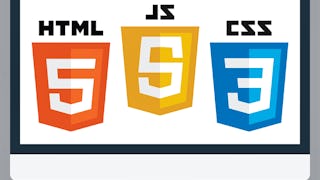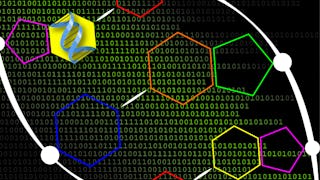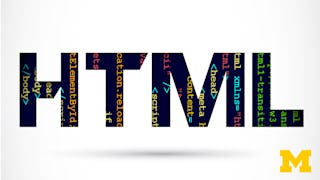Filter by
SubjectRequired
LanguageRequired
The language used throughout the course, in both instruction and assessments.
Learning ProductRequired
LevelRequired
DurationRequired
SkillsRequired
SubtitlesRequired
EducatorRequired
Explore the Theoretical Computer Science Course Catalog
 Status: New
Status: NewCoursera Instructor Network
Skills you'll gain: Prompt Engineering, Large Language Modeling, OpenAI, Scalability, Generative AI, Data Integration, Artificial Intelligence, Performance Tuning, Application Development, Application Programming Interface (API)
 Status: Free Trial
Status: Free TrialJohns Hopkins University
Skills you'll gain: HTML and CSS, Javascript, Responsive Web Design, Ajax, Front-End Web Development, Web Design, Web Applications, Hypertext Markup Language (HTML), Browser Compatibility, Web Development, Cascading Style Sheets (CSS), Usability, Cross Platform Development
 Status: Free Trial
Status: Free TrialJohns Hopkins University
Skills you'll gain: Bioinformatics, Data Science, Molecular Biology, Data Analysis, Programming Principles, Computer Science, Statistical Analysis, Computational Thinking, Big Data, Software Engineering, Algorithms, Biology
 Status: Free Trial
Status: Free TrialSkills you'll gain: Incident Response, Stakeholder Communications, Cyber Threat Intelligence, Cybersecurity, Incident Management, Security Awareness, Data Ethics, Security Information and Event Management (SIEM), Stakeholder Engagement, Data Security, Asset Protection, Information Privacy, Communication, Artificial Intelligence, Professional Networking
 Status: Free Trial
Status: Free TrialUniversity of Michigan
Skills you'll gain: Hypertext Markup Language (HTML), Web Content Accessibility Guidelines, Web Design and Development, Usability, Semantic Web, Cascading Style Sheets (CSS), Cloud Hosting, Web Servers, Data Validation, Web Development Tools
 Status: NewStatus: Free Trial
Status: NewStatus: Free TrialDassault Systèmes
Skills you'll gain: SolidWorks (CAD), Computer-Aided Design, 3D Modeling, Mechanical Design

Stanford University
Skills you'll gain: Mathematical Theory & Analysis, Mathematics and Mathematical Modeling, Calculus, Deductive Reasoning, Logical Reasoning
 Status: NewStatus: Free Trial
Status: NewStatus: Free TrialDassault Systèmes
Skills you'll gain: SolidWorks (CAD), 3D Modeling, Visualization (Computer Graphics), Computer-Aided Design, Mechanical Design
 Status: Free TrialStatus: AI skills
Status: Free TrialStatus: AI skillsMicrosoft
Skills you'll gain: Microsoft 365, Network Security, Business Software, Computer Hardware, Cybersecurity, Desktop Support, Virtual Private Networks (VPN), Network Troubleshooting, Technical Support, Hardware Troubleshooting, Hardware Architecture, Generative AI, Operating Systems, Collaborative Software, Network Protocols, TCP/IP, Application Security, Microsoft Teams, Information Systems Security, Multi-Factor Authentication
 Status: Free Trial
Status: Free TrialUniversity of London
Skills you'll gain: Computer Science, Computer Systems, Web Applications, Computer Networking, Computational Thinking, Theoretical Computer Science, Human Computer Interaction, Hardware Architecture, Operating Systems, Cybersecurity, Problem Management, Software Architecture
 Status: NewStatus: Free Trial
Status: NewStatus: Free TrialSkills you'll gain: C++ (Programming Language), System Programming, Performance Tuning, File Systems, File Management, Algorithms
 Status: NewStatus: Free Trial
Status: NewStatus: Free TrialDassault Systèmes
Skills you'll gain: SolidWorks (CAD), Computer-Aided Design, Technical Drawing, Engineering Drawings, 3D Modeling
Theoretical Computer Science learners also search
In summary, here are 10 of our most popular theoretical computer science courses
- LLM Engineering with RAG: Optimizing AI Solutions: Coursera Instructor Network
- HTML, CSS, and Javascript for Web Developers: Johns Hopkins University
- Introduction to Genomic Technologies: Johns Hopkins University
- Put It to Work: Prepare for Cybersecurity Jobs: Google
- Introduction to HTML5: University of Michigan
- xDesign Foundations: Sketching and Extrusion: Dassault Systèmes
- Introduction to Mathematical Thinking: Stanford University
- xDesign Revolution and Cut Features: Dassault Systèmes
- Microsoft IT Support Specialist: Microsoft
- How Computers Work: University of London










